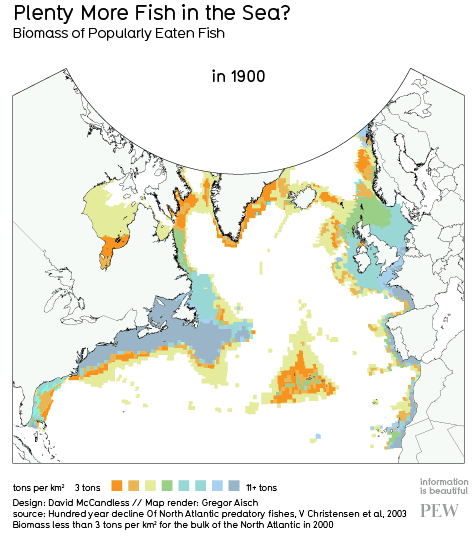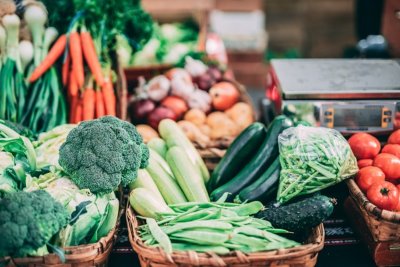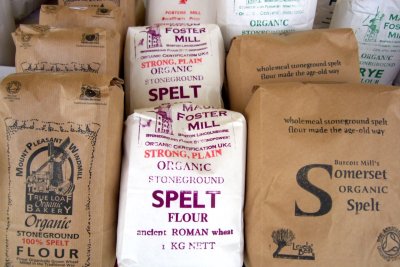The oceans play a critical role in our health and the health of the planet. They are buffering us against climate breakdown by absorbing roughly a quarter of the carbon dioxide that humans emit, and they soak up more than 90 percent of the excess heat trapped on Earth. According to a special report by the United Nations' Intergovernmental Panel on Climate Change, the oceans are warming and altering their chemical composition so dramatically that seafood supplies are under threat and cyclones and floods are a profound risk for hundreds of millions of people living along the coasts.

The graphic above, entitled 'Plenty more fish in the sea? Biomass of popularly eaten fish' (reproduced with kind permission from Information is Beautiful) illustrates the shocking decline in popular fish species over the past century.
The biggest threats to our ocean ecosystems are climate change itself, unsustainable fishing and plastic pollution. WWF estimate that we have lost half our marine creatures since 1970 and only one third of fish stocks in UK waters are harvested sustainably, which is a bit lower than the global average.
The climate and nature emergency therefore makes it more pressing than ever to protect marine ecosystems by buying sustainably produced fish.
Is any fish OK in a climate and nature emergency?
This is a complex question without a completely straightforward answer because everything that we eat has an environmental footprint. When the greenhouse gas emissions of key foods are compared, both wild and farmed fish have a lower footprint than chicken, palm oil, dairy and red meat, and also - perhaps surprisingly - a lower footprint than some non-meat foods like chocolate, coffee and olive oil (king prawns are the exception – see the note below). Wild caught fish has an even smaller footprint but still a higher impact than many non-meat proteins like soya, grains, fruit and vegetables and nuts. When other environmental impacts are taken into account, including acidification, antibiotic use and water small pelagic fisheries and mollusc aquaculture have been found to have the lowest impact of any animal-based foodstuff.
Like many foods, the environmental impact of fish varies greatly by species and how it is caught or farmed, but there are a few principles that can ensure we consume fish with the climate and nature emergency in mind:
- Less and Better: Overall, the UK should halve the amount of meat and dairy in our diets to keep climate change within 1.5 degrees of warming. This means reducing the dependence on meat proteins in recipes, and what remains must come from sustainable sources.
- If you are a business, tell the truth about the fish you serve. Don’t pretend something is sustainable if it isn’t. Find out exactly where your fish is from and how it was caught or farmed and be honest with customers. If you can’t be sure where the fish is from, don't use it.
- Use sustainable fish by avoiding red-rated fish completely, and choosing green-rated, MSC, ASC or Organic certified sustainable fish wherever possible
- Use shellfish that filter pollution out of water and fix carbon in their shells. Their culture can actually have a positive impact on the environment. They include mussels, oysters, clams and cockles.
- Mid water-table schooling fish are a good choice. 80% of the carbon footprint of fishing comes from the fuel used to power the boat, so schooling species including anchovies, sardines, herring and mackerel require very little energy to produce.
- Local fish caught by dayboats use less fuel than those taking longer trips
- Avoid bottom-trawled fish as this uses loads of fuel
- For farmed fish, the feed used on farms increases its footprint, so the best are species which are lower on the food chain, including mussels, tilapia and pangasius.
- As a rule of thumb, transport is a relatively small part of the environmental footprint of fish. So if pushed, buy sustainable fish from abroad rather than overfished local produce
- Buy less processed food. Food processing constitutes about 20% of all the energy in the UK food system so you can cut your footprint by buying more fresh food.
- Stop eating farmed king prawns. They have a very high carbon footprint and their farms have been responsible for widespread destruction of one of the world's most valuable natural coastal defences; mangrove forests.
How are Sustainable Fish Cities helping to tackle the climate and nature emergency?
The Sustainable Fish Cities campaign is aiming to see unsustainable fish off the menu for good in UK restaurants, caterers, the public sector and at influential events. We believe we need a critical mass of businesses committed to only buying sustainable fish, and we believe that government needs to respond to this growing demand by making all the UK’s fisheries verifiably sustainable, as soon as possible.
Businesses serving nearly one billion meals per year have committed to adopting a sustainable fish buying policy, across 17 towns and cities. The market for sustainable fish is growing ten times faster than for conventional fish. The UK has the opportunity to become a world leader in well-managed fisheries and flourishing marine ecosystems – which would bring jobs and opportunities for coastal communities. In fact, UK fisheries are currently missing out on over £60 million per year in business becasue catering companies are going abroad for sustainable fish. We need fishing policy fit for the future.
How can you help?
We’re all in this together and you can help by:
 'Tackle' your own fish buying by eating fish according to our top tips above
'Tackle' your own fish buying by eating fish according to our top tips above
 You have more power than you think – if you have a workplace restaurant, plan catering for meetings or events, have children at school, or a loved one in hospital or a care home, as a valued customer your requests for the food served to be sustainable would be very powerful.
You have more power than you think – if you have a workplace restaurant, plan catering for meetings or events, have children at school, or a loved one in hospital or a care home, as a valued customer your requests for the food served to be sustainable would be very powerful.
Find some more actions that you can take.
Sustainable Fish: A campaign to protect precious marine environments and fishing livelihoods, and call for fish to be bought from sustainable sources. We want to show what can be done if people and organisations make a concerted effort to change their buying habits.



